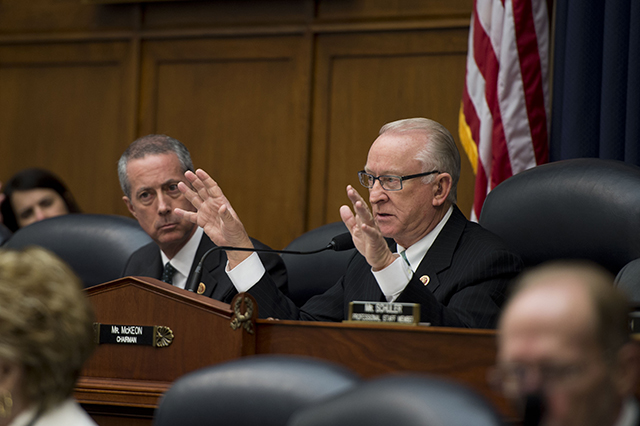Armed Services Chairman on Obama: ‘Our Foreign Policy Is a Mess’
Ken McIntyre /

Rep. Buck McKeon (R-Calif.) chairs the Armed Services Committee. (Photo: Erin A. Kirk-Cuomo/Newscom)
President Obama’s wrongheaded view of the world has weakened America’s military and turned foreign policy into a “mess” — and Republicans bear some of the responsibility, the chairman of the House Armed Services Committee said yesterday.
“It is no accident that the expansion of Russia and China has come at the exact moment when we are dismantling our military and retreating from the world,” Rep. Buck McKeon (R- Calif.) said in a speech at The Heritage Foundation aimed at drawing attention to defense and national security issues.
“With Russia invading Ukraine, China provoking our Pacific allies, al-Qaeda regrouping, North Korea banging the drum, and ongoing turmoil in the Middle East, I think the president has lost sight of his purpose here,” McKeon said.
McKeon’s appearance at Heritage was part of “Protect America Month” events organized by the think tank.
Americans, McKeon argued, ought to be asking what the nation’s central foreign policy goal is, and what role the U.S. military has in advancing it. He said:
“Put plainly, our foreign policy is a mess. We have no coherent strategy. I’m not sure if we’re supposed to be pivoting to Asia, pivoting to the Middle East, or pivoting back to Europe.”
The California Republican, who announced four months ago that he will retire next January after 22 years in Congress, argued that most Americans want to live “in peace and security,” free to prosper and make their own decisions without worrying about what’s going on in “faraway lands.”
He cited Abraham Lincoln’s formula that government’s legitimate aim is “to do for a community of people whatever they need to have done, but cannot do for themselves.”
“An individual can go out and find health care coverage without the government,” McKeon said. “They can save for retirement without the government. They can start a business without the government. But they cannot resist foreign aggression without a strong standing military.”
At the core, he said, both diplomacy and military power are services that a government provides to citizens. Obama has not understood this:
“Instead of using the military to deter terrorists and aggressors abroad, this administration uses regulations and bureaucrats to deter innovators and entrepreneurs at home.
“Instead of striking a balance where government is discreet at home while projecting great strength abroad, government is intrusive at home and weak overseas.”
However, McKeon insisted, rather than effectively responding to Obama in the budget process, Republicans “played his game” and “fell into his trap.” And now, he said, painful choices leave many military spending needs unmet.
In the “chairman’s mark” for the National Defense Authorization Act that he introduced today, the California Republican said, he requested $521 billion for the base defense budget and $79 billion for the windup of the war in Afghanistan. Defense spending comes in $45 billion under last year’s request, as required by previous budget deals Congress cut with the White House, he said.
“Through smart planning, rearrangement of capital and resources, targeted cuts, and reduction of some bureaucracy, we’ve been able to shield our military from a crippling blow,” McKeon remarked. “This is the last year we’ll be able to triage the pain. Next year — unless something changes — it’s really going to hurt.”
Identified savings will allow the Pentagon to keep the USS George Washington, the Navy’s front-line carrier, in Asia as well as to purchase more Tomahawk missiles, Growler electronic aircraft, body armor, and improved aircraft ejection seats.
However, the A-10 Warthog air-support craft will go into storage for later use, McKeon said, to make way for the F-35 even though that plane “is better suited to do other jobs.”
Without tackling mandatory and entitlement spending elsewhere in the federal budget, McKeon said, in next year’s defense plan“we’re going to have to whittle our big stick down to a twig, and our diplomacy will suffer for it.”
This story was produced by The Foundry’s news team. Nothing here should be construed as necessarily reflecting the views of The Heritage Foundation.
